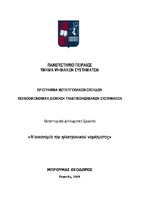Η οικονομία του ηλεκτρονικού νομίσματος

Προβολή/
Λέξεις κλειδιά
Κρυπτονομίσματα ; Ηλεκτρονικό νόμισμα ; Οικονομία ; Θεσμικό πλαίσιο ; BlockchainΠερίληψη
Τα κρυπτονομίσματα είναι ένα κρυπτογραφημένο δίκτυο peer-to-peer για τη διευκόλυνση της ψηφιακής ανταλλαγής.Είναι μια τεχνολογία που αναπτύχθηκε πριν από οκτώ χρόνια. Ενώ τα κρυπτονομίσματα δεν είναι πιθανό να αντικαταστήσουν το παραδοσιακό νόμισμα, θα μπορούσαν να αλλάξουν τον τρόπο αλληλεπίδρασης των παγκόσμιων αγορών συνδεδεμένων με το Διαδίκτυο, απομακρύνοντας τα εμπόδια γύρω από τα εθνικά νομίσματα και τις συναλλαγματικές ισοτιμίες. Η τεχνολογία προχωρεί με ταχύ ρυθμό και η επιτυχία μιας δεδομένης τεχνολογίας υπαγορεύεται σχεδόν αποκλειστικά από την αγορά στην οποία επιδιώκει να βελτιωθεί. Τα κρυπτονομίσματα μπορούν να φέρουν την επανάσταση στις αγορές ψηφιακού εμπορίου δημιουργώντας ένα ελεύθερο εμπορικό σύστημα χωρίς χρεώσεις/φόρους. Η παρούσα εργασία με τίτλο «Η οικονομία του ηλεκτρονικού νομίσματος» εξηγεί και αναλύει όλο το φάσμα των ενεργειών για την δημιουργία ,την αγορά και την πώληση των κρυπτονομισμάτων. Επίσης αναλύεται η τεχνολογία πάνω στην οποία βασίζονται τα κρυπτονομίσματα, δηλαδή της αλυσίδας Blockchain. Η κατανόηση της ικανότητας των κρυπτονομισμάτων να αντικαταστήσουν τα τρέχοντα νομίσματα απαιτεί μια εξέταση του βαθμού στον οποίο τα κρυπτονομίσματα πληρούν τα κύρια χαρακτηριστικά του χρήματος, δηλαδή ένα μέτρο αξίας, μια αποθήκη αξίας και ένα μέσο ανταλλαγής.Το δεύτερο θέμα είναι το πώς τα κρυπτονομίσματα ενδέχεται να αλλάξουν τη φύση της νομισματικής πολιτικής και την εφαρμογή της. Η διαχείριση του παραδοσιακού χρήματος από τις αρχές νομισματικής πολιτικής είναι εν μέρει αυτόματη και εν μέρει διακριτική. Το πρωτόκολλο κρυπτογράφησης λειτουργεί με έναν προκαθορισμένο αλγόριθμο, καθιστώντας τη διαχείρισή του πλήρως αυτόματη. Είναι δύσκολο σήμερα να φανταστούμε πώς οι αλγόριθμοι θα μπορούσαν να είναι πλήρως αποτελεσματικοί στην αντιμετώπιση πολύπλοκων αποφάσεων σε έναν αβέβαιο κόσμο. Το πιο σημαντικό όμως είναι ότι η έλλειψη πραγματικού προσώπου πίσω από την αυτόματη λήψη αποφάσεων συνεπάγεται ότι τέτοιοι αλγόριθμοι δεν θα μπορούσαν να ληφθούν υπόψη. Αυτό αποτελεί σημαντικό κενό επειδή η αξία ενός νομίσματος αποτελεί βασικό στοιχείο της ικανότητας της κοινωνίας να ευημερεί και ως εκ τούτου η λήψη αποφάσεων σε σχέση με αυτό το νόμισμα είναι μια δύναμη που πρέπει να παρακολουθείται προσεκτικά. Οι υπεύθυνοι για τη νομισματική πολιτική στους οποίους χορηγείται αυτή η εξουσία αποτελούν μέρος της δέσμης εθνικών πολιτικών που υπόκεινται σε παρακολούθηση και αναθεώρηση.


